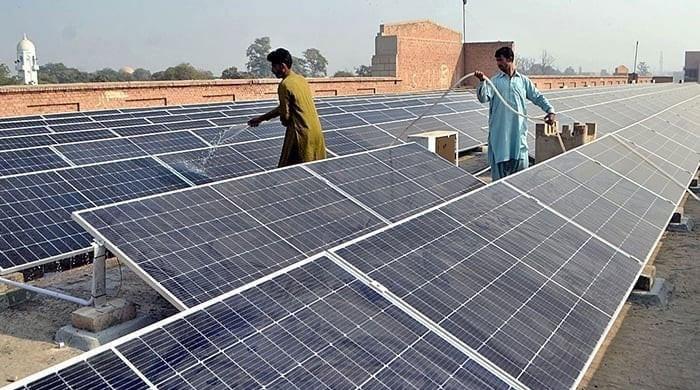Pakistan’s electricity grid has faced mounting pressure for the last few years as more households installed rooftop solar panels.
While solar energy remains vital for a sustainable future, the existing net-metering policy inadvertently has led to cost imbalances – disproportionately affecting those who cannot afford solar panels.
These grid-reliant consumers unknowingly bear the financial burden of those going off-grid.
Since the proposed policy change was not implemented, solar users continue to sell excess electricity back to the grid at the previously higher buy-back rate. While this helps them recover their investment quickly, it continues to place a cost burden on non-solar users.
The Power Division has documented a significant rise in net-metering connections, with installed solar capacity increasing from 321MW in 2021 to 3,277MW by 2024.
Net-metering consumers have grown to 283,000, accounting for 0.77% of the 37 million electricity users nationwide. This trend, if unchecked, could escalate the system’s burden to Rs503 billion over the next decade.
The government had recently proposed a revision to its net-metering policy, suggesting a reduction in the buyback rate for surplus solar electricity from Rs27 to Rs10 per unit. Although the implementation of this decision has been paused, it remains a topic of active discussion.
Any changes to the policy should be carefully evaluated to ensure they strike a balance between encouraging renewable energy adoption and maintaining economic viability for all stakeholders involved.
This setup enabled affluent consumers to rapidly recover their investment in solar systems, while the cost was shifted to those relying solely on grid electricity. This structure results in prosumers being compensated not only for the energy they supply but also for fixed charges they don’t actually bear.
As a result, these excess costs are shifted to non-solar consumers, increasing their electricity rates by an estimated Rs1.5 to Rs2 per kWh.
The proposed change in the buyback rate reduction aimed to create a fairer distribution of electricity costs, ensuring that those without solar panels are not unfairly subsidising solar users.
For grid-reliant consumers, this would have meant an end to the financial loopholes favouring a select few.
Beyond cost savings, this policy shift would also improve grid stability. With an increasing number of solar users feeding electricity into the system at unpredictable times, power distribution has become more challenging.
By adjusting the buyback rate, the government can ensure that the grid can function more efficiently, reducing the risk of overloads and voltage fluctuations.
Grid modernisation is necessary to support the integration of distributed solar generation. A stable and well-balanced power sector benefits consumers and lays the foundation for economic progress.
The adoption of smart meters, advanced inverter technologies, and a Battery Energy Storage System (BESS) is critical for enhancing grid resilience and efficiency.
While some argue that this change may slow down solar adoption, the government earlier maintained that it would have been a necessary step to prevent financial losses and create a sustainable energy future for all.
This policy shift, combined with the efforts of power sector leaders like K-Electric – which is modernising grid infrastructure and integrating renewables – ensures that both solar and non-solar users benefit from a balanced energy landscape.
A progressive Pakistan requires an energy sector that supports long-term growth rather than short-term gains for a select few. By promoting fairness and efficiency in electricity distribution, the policy changes set the stage for a more resilient economy, increased industrial output, and a stronger future for all Pakistanis.
In Karachi, significant advancements have been made in the power sector through various initiatives aimed at modernising grid infrastructure, reducing transmission and distribution losses, and the plan for integrating renewable energy sources into the power supply.
These efforts have played a crucial role in enhancing the reliability and efficiency of electricity distribution in the region.
The modification in the net-metering policy aimed at creating a more equitable system that discourages misuse while promoting sustainable solar energy adoption.
Coupled with contributions from the corporate sector to modernise the power sector, these measures would aim to ensure a balanced and efficient energy landscape in Pakistan.
Globally, countries facing similar challenges have implemented reforms to create fairer energy markets. In Germany, where renewable energy adoption is high, policymakers have adjusted solar incentives to ensure affordability for all consumers while maintaining grid stability.
Reforms to the Energy Industry Act (EnWG) introduced measures to prevent blackouts caused by solar PV grid overloads. Instead of shutting off at a fixed 50.2 Hertz, photovoltaic systems now reduce power gradually at varying frequencies.
Since 2018, this controlled response has been mandatory across Europe, helping stabilise grid frequency and improve reliability. The Solar Peak Law also introduced measures to manage solar energy surpluses better and enhance grid stability, applying to new PV systems with an output of 2 kWh or more.
Similarly, in Australia, revisions to net-metering policies have aimed to prevent excessive financial strain on non-solar users, creating a more balanced system.
The Australian Energy Market Commission (AEMC) introduced reforms allowing power networks to offer a range of options, including a basic free service, to encourage solar owners to limit solar waste, save money, and reduce costs for all consumers.
Learning from these examples, Pakistan’s policy shift, if implemented, will be a step towards a sustainable and inclusive energy future. However, long-term success depends on continuous innovation, efficient regulation and collaborative efforts from all stakeholders.
The writer is an energy efficiency and renewable energy expert. He can be reached at: [email protected]
Disclaimer: The viewpoints expressed in this piece are the writer’s own and don’t necessarily reflect Geo.tv’s editorial policy.
Originally published in The News


